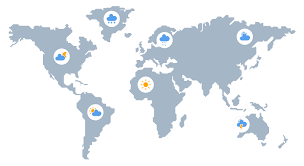Weather impacts almost every aspect of our lives, from travel and outdoor events to business operations and planning. What if businesses could tap into real-time weather data to make smarter decisions? That's where weather API comes into play. In this article, we explore how leveraging live weather API for business intelligence can provide a competitive edge.
What Are Weather APIs?
A weather API (application programming interface) is a tool that allows developers to access weather data in real-time or near-real-time from various sources such as weather stations, satellites, and other monitoring systems. These APIs provide valuable information such as temperature, precipitation, humidity, wind speed, and more. Weather API can return data in formats such as JSON, making it easy for developers to integrate them into applications and services.
 |
Benefits of Weather API for Businesses
Enhanced Decision-Making: Access to real-time weather data enables businesses to make data-driven decisions based on current and forecasted conditions.
Improved Efficiency: Companies can optimize their operations and logistics based on accurate current weather data, reducing disruptions and delays.
Increased Safety: Real-time alerts about severe weather conditions help keep employees and customers safe.
Cost Savings: Businesses can minimize weather-related losses and reduce costs by adjusting operations according to weather information.
Applications Across Industries
Weather API has a wide range of applications across different industries:
Agriculture: Farmers use weather data to make decisions about planting, harvesting, and irrigation.
Transportation: Airlines, shipping companies, and delivery services use weather API to plan routes and schedules.
Retail: Retailers adjust inventory and promotions based on weather patterns.
Energy: Energy companies use weather data to predict demand and adjust supply accordingly.
The Best Weather API Available
There are several best weather APIs that businesses can use:
Weatherstack API: Offers real-time weather data and historical information.
Weather Channel API: Provides extensive data and analytics for various applications.
OpenWeatherMap: Known for its free weather API options and community support.
How to Choose the Right Weather API
When selecting a weather service API, consider the following factors:
Data Coverage: Ensure the API offers data for the geographic areas you need.
Data Accuracy: Look for an API with a track record of providing reliable data.
Ease of Integration: Choose an API that supports your development language and framework.
Cost: Compare pricing plans and options for free weather API.
Integrating Weather API with Dashboards
Many businesses use weather dashboard JavaScript integrations to visualize weather data for their operations. This allows teams to quickly understand current conditions and forecasts. You can create custom dashboards to display data relevant to your business, such as temperature, precipitation, or wind speed.
Real-Life Success Stories
E-commerce: An online retailer used a weather API to adjust promotions based on regional weather patterns, resulting in higher sales during cold weather.
Logistics: A delivery company optimized routes and avoided delays by integrating real-time weather data into their logistics software.
Challenges and Considerations
While weather API offers numerous benefits, there are challenges to keep in mind:
Data Reliability: Ensure the API provides accurate and up-to-date data.
Legal and Privacy: Consider regulations around using location data and personal information.
Technical Issues: Integrating weather API may require ongoing maintenance and updates.
Best Practices for Using Weather API
Regularly Monitor Data: Continuously check the accuracy and reliability of the weather data.
Set Up Alerts: Create automated alerts for significant weather changes.
Customize Integrations: Tailor API used for your specific business needs.
Stay Informed: Keep up with advancements in weather data and API technology.
Conclusion
Live weather API provides businesses with the ability to harness current weather data API and real-time weather data for intelligent decision-making. By choosing the right best free weather API and integrating it effectively, businesses can gain valuable insights that improve operations and safety.
FAQs
What is a weather API?
A weather API allows developers to access real-time or near-real-time weather data for integration into applications and services.
Why is weather data recorded?
Weather data is recorded to monitor and analyze weather patterns, forecast conditions, and provide valuable information for various industries.
Which is the best weather API?
Some of the best weather APIs include Weatherstack API, Weather Channel API, and OpenWeatherMap.
How do businesses benefit from using weather API?
Businesses can improve decision-making, efficiency, safety, and cost savings by leveraging weather API for real-time data.
How can businesses integrate weather API?
Businesses can integrate weather API into their systems using languages such as JavaScript to create custom dashboards for weather data visualization.
Comments
Post a Comment